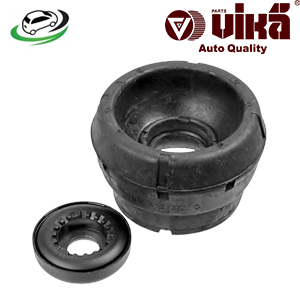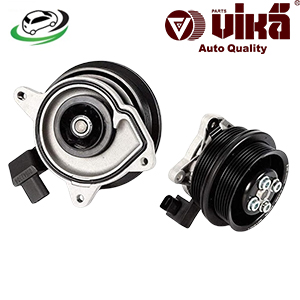-23%
Get VW Tiguan 1.4 TSI Dual Supercharged Engine Coolant Water Pump 03C121004J in Kenya
The metal coolant water pump is a key component of a vehicle’s cooling system. Its primary role is to circulate coolant throughout the engine and radiator to maintain optimal operating temperatures. This comprehensive overview will cover the construction, function, benefits, common issues, and maintenance of metal coolant water pumps.
Construction and Function of a Metal Coolant Water Pump
Construction:
The metal coolant water pump is typically constructed from high-quality materials such as cast iron or aluminum, which are chosen for their durability and heat resistance. The main components include:
- Pump Housing:
- Material: Made from metal alloys like cast iron or aluminum.
- Function: Houses the internal components of the pump and channels coolant through the system.
- Impeller:
- Material: Often made from metal or composite materials.
- Function: Rotates within the pump housing to create a flow of coolant. The impeller blades push the coolant through the engine and radiator.
- Seal and Bearing Assembly:
- Seal: Prevents coolant from leaking out of the pump.
- Bearing: Supports the impeller shaft and allows smooth rotation.
- Pulley or Drive Mechanism:
- Function: Attached to the pump and driven by the engine’s serpentine belt or timing belt, providing the mechanical energy needed for the pump to operate.
Function:
- Coolant Circulation:
- Flow Creation: The metal water pump circulates coolant through the engine block and radiator, ensuring that the engine maintains a consistent and safe operating temperature.
- Heat Transfer: By circulating coolant, the pump helps transfer heat from the engine to the radiator, where it is dissipated into the air.
- Temperature Regulation:
- Consistent Cooling: Maintains consistent engine temperatures by ensuring that coolant is continuously flowing through the system.
- Prevents Overheating: Helps prevent engine overheating by efficiently removing excess heat from the engine.
- Pressure Management:
- System Pressure: Maintains proper pressure within the cooling system, which is essential for preventing coolant boiling and maintaining effective heat transfer.
Benefits of a Metal Coolant Water Pump
- Durability and Strength:
- Long Lifespan: Metal coolant water pumps, especially those made from cast iron or high-grade aluminum, offer excellent durability and can withstand high temperatures and pressures.
- Resistant to Wear: Metal construction provides resistance to wear and tear, contributing to the pump’s long-term reliability.
- Effective Cooling:
- Consistent Performance: Provides consistent and reliable coolant circulation, which is crucial for maintaining optimal engine temperature and performance.
- Enhanced Heat Transfer: Efficiently transfers heat from the engine to the radiator, helping to prevent overheating and engine damage.
- Improved Engine Efficiency:
- Optimal Temperature Maintenance: By maintaining the engine at the correct operating temperature, the water pump helps improve fuel efficiency and engine performance.
- Reduced Emissions: Proper engine cooling can lead to better combustion efficiency and reduced exhaust emissions.
- High-Temperature Tolerance:
- Heat Resistance: Metal water pumps can tolerate high temperatures, making them suitable for vehicles operating in extreme conditions or under heavy loads.
- Resilient Construction: Metal materials can handle the thermal stresses associated with engine cooling, reducing the risk of pump failure.
- Reliability:
- Consistent Operation: The robust design of metal water pumps ensures reliable operation over an extended period, reducing the likelihood of unexpected failures.
- Low Maintenance: High-quality metal water pumps require less frequent maintenance compared to some plastic alternatives.
Common Issues with Metal Coolant Water Pumps
- Leakage:
- Seal Failure: The seal around the pump can deteriorate over time, leading to coolant leaks.
- Gasket Issues: Faulty gaskets or improper installation can also cause leaks.
- Bearing Wear:
- Bearing Failure: The bearings in the pump can wear out, leading to noisy operation and reduced efficiency.
- Impeller Damage: Worn bearings can also cause damage to the impeller, affecting coolant flow.
- Corrosion:
- Rust Formation: Metal water pumps can suffer from corrosion, especially if coolant is not regularly replaced or if the system is exposed to contaminants.
- Metal Deterioration: Corrosion can weaken the metal and lead to leaks or pump failure.
- Overheating:
- Insufficient Flow: A malfunctioning water pump can reduce coolant flow, leading to engine overheating.
- Blocked Passageways: Debris or sediment in the cooling system can block the pump’s passageways, affecting performance.
- Noise and Vibration:
- Operational Noise: Worn bearings or damaged impellers can cause excessive noise and vibration during operation.
- Unusual Sounds: Grinding or squealing noises may indicate a failing water pump.
Signs of a Failing Metal Coolant Water Pump
- Coolant Leaks:
- Visible Leaks: Puddles or spots of coolant under the vehicle may indicate a leak from the water pump.
- Low Coolant Levels: Persistent low coolant levels, despite refilling, can be a sign of a leaking pump.
- Overheating Engine:
- Temperature Gauge: If the engine frequently overheats or the temperature gauge shows unusually high readings, it may be due to a failing water pump.
- Boiling Coolant: Overheating can cause coolant to boil over, leading to steam or smoke from the engine bay.
- Unusual Noises:
- Grinding or Whining: Grinding, whining, or squealing noises from the water pump area may indicate bearing failure or impeller damage.
- Clunking Sounds: Clunking or rattling noises can signal loose or damaged components.
- Poor Engine Performance:
- Reduced Power: A malfunctioning water pump can lead to decreased engine performance, including reduced power and acceleration.
- Engine Stalling: In severe cases, engine stalling or hesitation may occur due to overheating.
- Warning Lights:
- Dashboard Indicators: Some vehicles have dashboard warning lights or messages indicating cooling system issues or low coolant levels.
Maintenance and Replacement of Metal Coolant Water Pumps
- Regular Inspections:
- Visual Checks: Periodically inspect the water pump for signs of leaks, corrosion, or damage. Check coolant levels and look for any unusual noises during operation.
- Cooling System Evaluation: Have the entire cooling system checked regularly by a professional mechanic to ensure proper functioning.
- Coolant Maintenance:
- Regular Flushing: Follow the manufacturer’s recommendations for coolant flushes and replacements to prevent contamination and corrosion.
- Coolant Quality: Use high-quality coolant and maintain the correct mixture of coolant and water.
- Timely Replacement:
- Replace Worn Pumps: If signs of failure are detected, such as leaks or unusual noises, replace the water pump promptly to prevent engine damage.
- Choose Quality Parts: Use OEM or high-quality aftermarket parts to ensure proper fit and performance.
- System Checks:
- Inspect Belts and Hoses: Check the serpentine belt or timing belt and associated hoses for wear and replace them as needed.
- Alignment and Installation: Ensure proper alignment and installation of the new water pump to avoid potential issues.
Follow us on Facebook for more parts.



